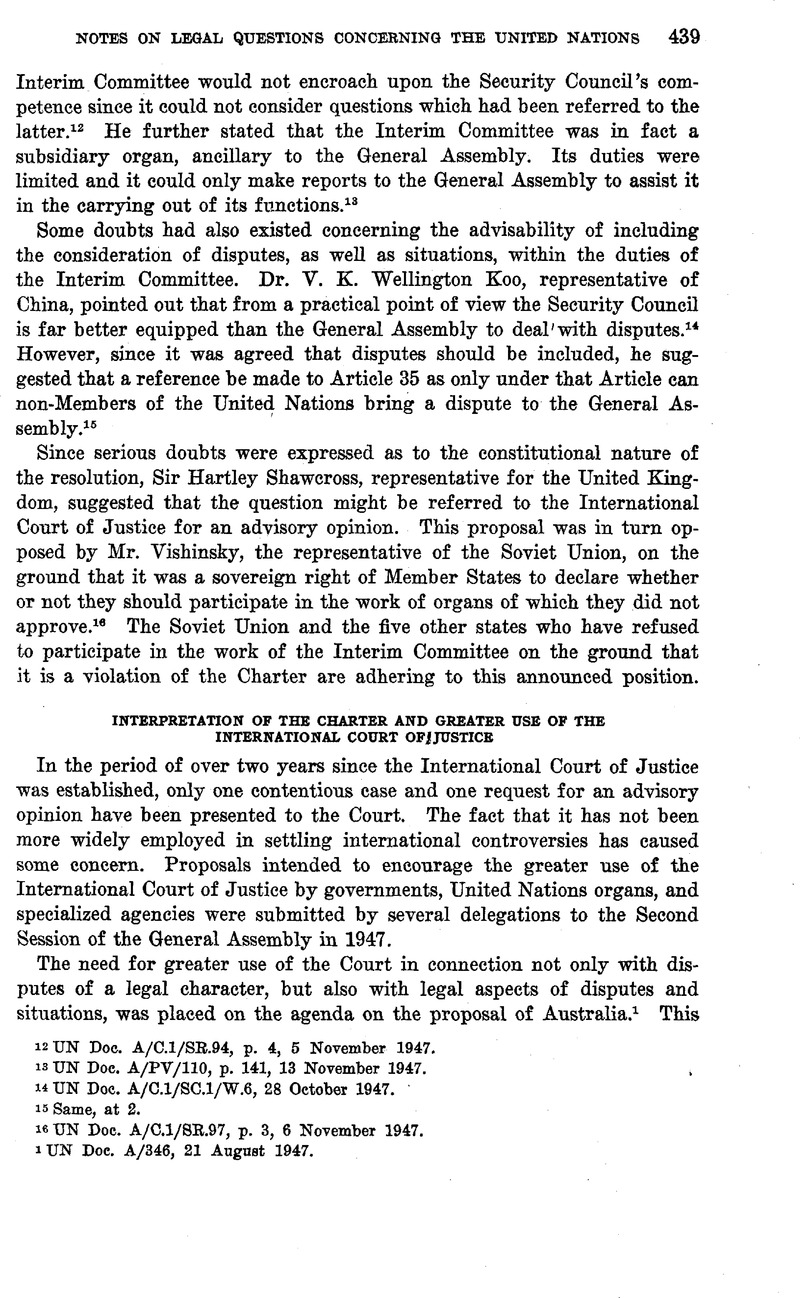No CrossRef data available.
Published online by Cambridge University Press: 20 April 2017

1 UN Doc. A/346, 21 August 1947.
2 UN Doc. A/C.6/134, 24 September 1947.
3 UN Doc. A/C.6/165, 8 October 1947.
4 UN Doc. A/C.6/164, 8 October 1947.
5 UN Docs. A/C.6/SR.44, 8 October 1947, and A/C.6/SR.45, 9 Oetober 1947.
6 UN Doc. A/C.6/SR.44, p. 2,8 October 1947.
7 Same, p. 4.
8 UN Doc. A/C.6/SR.45, pp. 3–4, 9 October 1947.
9 Same, p. 5.
10 UN Doc. A/C.6/SR.52, 22 October 1947.
11 UN Doc. A/C.6/167/Rev. 1, 14 October 1947.
12 In addition to the Security Council, General Assembly, Economic and Social Council and Trusteeship Council, the following specialized agencies are authorized to request advisory opinions: International Labor Organization, United Nations Economic, Scientific and Cultural Organization, Food and Agricultural Organization, International Civil Aviation Organization, International Bank for Reconstruction and Development, International Monetary Fund, International Telecommunications Union, and the World Health Organization.
13 UN Doc. A/C.6/168/Rev.l, 14 October 1947.
14 UN Doc. A/C.6/169/Rev.l, 14 October 1947.
15 UN Doc. A/C.6/SR.52, pp. 9–10, 22 October 1947. The first resolution, recommending reconrse to advisory opinions, was adopted by 39 votes to 7. The second resolution, authorizing the Trusteeship Council to request advisory opinions, was adopted by 38 votes to 0 with 6 abstentions. The third resolution, recommending acceptance of compulsory jurisdiction and submission of disputes to the Court was accepted by 37 votes to 5, with 5 abstentions.
16 UN Doc. A/459, and A/C.6/SR.55, 11 November 1947.
17 UN Doc. A/PV/113, 14 November 1947.
18 Id. at 147–151 and 156 (Resolution 171 (II), A, B and C). The first and third resolutions were accepted by votes of 46 to 6 with 2 absentions, and 45 to 6 with 3 abstentions. The second resolution was adopted unanimously when the Soviet Union withdrew its objection, after expressing the view that the vote should not serve as a precedent for authorizing agencies to request advisory opinions prior to obtaining the consent of the agency.
19 Particular reliance was placed on the Report of the Sub-Committee IV/2/B, Doc. 887, IV/2/39, 9 June 1945. This report was reprinted at the request of the Delegation of the USSR as UN Doc. A/474, 13 November 1947. The following is an extract of this report:
In the course of the operations from day to day of the various organs of the Organisation, it is inevitable that each organ will interpret such parts of the Charter as are applicable to its particular functions. . . . Difficulties may conceivably arise in the event that there should be a difference of opinion among the organs of the Organization concerning the correct interpretation of a provision of the Charter. . . . If two member states are at variance concerning the correct interpretation of the Charter, they are of course free to submit the dispute to the Internaional Court of Justice as in the case of any other treaty. Similarly, it would always be open to the General Assembly or to the Security Council, in appropriate circumstances, to ask the International Court of Justice for an advisory opinion concerning the meaning of a provision of the Charter. Should the General Assembly or the Security Council prefer another course, an ad hoc committee of jurists might be set up to examine the question and report its views, or recourse might be had to a joint conference. In brief, the members or the organs of the Organization might have recourse to various expedients in order to obtain an appropriate interpretation. It would appear neither necessary nor desirable to list or to describe in the Charter the various possible expedients.
20 UN Doc. A/PV/113, p. 111, 14 November 1947.
21 Same, p. 102.
22 U N Doc. A/459, p. 3, 11 November 1947.
23 Resolution 113 (II) B, 17 November 1947.
24 UN Doc. A/459, pp. 2–3, 11 November 1947.
25 U N Doc. A/C.6/SR.52, p. 4, 22 October 1947; U N Doc. A/P V/113 , pp. 51–61, 14 November 1947.
26 UN Doc. A/PV/113, p. 116, 14 November 1947; A/C.6/SR.52, p. 8, 22 October 1947.
27 UN Doc. A/C.6/SR.52, p. 6, 22 October 1947.
28 The representative of Colombia abstained from voting on this paragraph as he considered it contrary to the spirit of the Charter which made the development of international law a General Assembly task. UN Doc. A/C.6/SR.52, p. 9, 22 October 1947.